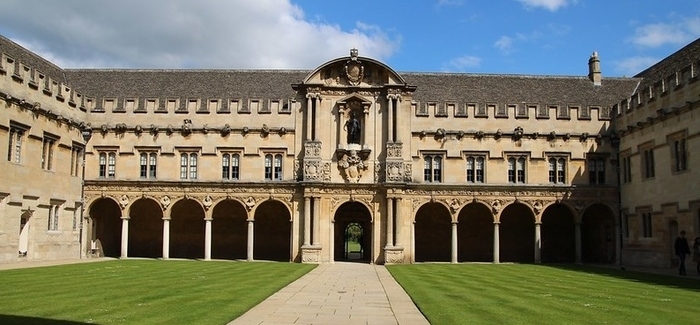As a city, London has plenty to offer and that includes universities too. If you’re looking to study in England’s capital then good news, you’re spoilt for choice. However, when it comes to choosing the best university in the city, two London universities in particular stand out from the crowd.
University College London (UCL) and Imperial College London are the two highest-ranked London universities in the QS World University Rankings® 2020, beating 19 other universities from the city and ranking in the top 10 in the world, a feat both universities have managed consistently.
This year, UCL climbed two places and overtook Imperial to rank eighth in the world, while Imperial dropped one place to rank ninth this year. But is this enough to mean that UCL is right for you?
Choosing between the top universities in London
Rather than relying on the world ranking alone, it might be more useful to consider how these two universities perform for the subject you wish to study. While UCL operates across the full academic spectrum, Imperial specializes primarily in science, engineering, management and medicine, and also has a leading business school. So, if your area of interest is one of the arts, humanities or social sciences disciplines, you should probably apply to UCL. Alongside world-leading departments of the arts and sciences, UCL also boasts a top-rated architecture school and one of the UK’s best art schools, the Slade School of Art.
So far, so simple... But, in fact, there are numerous academic areas where University College London and Imperial are both near the top of the tree, so for students in these areas the decision is considerably tougher. We’ll look at these subjects in closer detail in a moment. Before then, to get a fuller idea of whether you’d be best suited to UCL or Imperial, here’s a quick overview of the key similarities and differences, including comparisons of tuition fees, student population, international reputation and more…
|
|
UCL (University College London) |
Imperial College London |
|
QS World University Rankings® 2020 |
Ranked eighth in the world in 2019 Ranked 14th in the world by academics and 18th by employers 43rd for faculty/student ratio 68th for research impact (citations per faculty member) 79th in the world for percentage of international faculty members, and 16th for international students |
Ranked ninth in the world in 2019 Ranked 21st in the world by academics and ninth by employers 30th for faculty/student ratio 85th for research impact (citations per faculty member) 46th in the world for percentage of international faculty members, and 14th for international students |
|
Subject strengths* |
15th in the world for arts & humanities 49th for engineering & technology 10th for life sciences & medicine Joint 63rd for natural sciences 34th for social sciences & management |
Joint 194th in the world for arts & humanities Joint eighth for engineering & technology Joint 14th for life sciences & medicine 10th for natural sciences 50th for social sciences & management |
|
Location |
Main campus is located in Bloomsbury, central London |
Main campus is in South Kensington in west London (still quite central) |
|
Student community |
Around 41,539 students in total in 2017/18– 19,232undergraduates, 22,307 postgraduates. 13,387 of these are international (32%). |
Around 17,054 students in 2017/18- 9,767 undergraduates, 7,287 postgraduates. Of these, 6,379 are international (37 percent). |
|
Tuition fees (2018/19) |
UK and EU undergraduates: £9,250 per year (about €10,400) International students: £18,430 - 27,220 (~US$23,100-37,050) annually for most undergraduate programs Medicine: £34,660 (about US$43,400) per year for international students |
UK and EU undergraduates: £9,250 per year (about €10,400) International students: £28,000 – 31,000 (~US$35,040 – 38,800) annually for most undergraduate programs Medicine: £41,000 (about US$51,300) per year for international students |
*Based on the broad subject areas in the QS World University Rankings by Subject 2019.
QS World University Rankings® 2020
As mentioned earlier, UCL is now ranked above Imperial in the QS World University Rankings® 2020, ranking eighth to Imperial’s ninth.
Imperial is not to be ignored, however, as it also scores consistently well, ranking firmly within the world’s top 100 in every performance indicator used to compile the rankings, and outranking UCL in four out of the six indicators, including a slightly higher score for the citations per faculty member indicator (a measure of research impact).
UCL markets itself as London’s global university, and it does indeed have a high proportion of international students, ranking 16th in the world on this indicator. However, Imperial has an even higher proportion and ranks 14th on this measure.
Imperial also offers a higher proportion of international faculty members (46th in the world, above UCL’s 79th). Despite this advantage in our rankings, both Imperial and UCL should appeal to students keen to join a truly international community of students and academics.
In terms of reputation, UCL beats Imperial among academics, while Imperial has a slightly stronger reputation among graduate employers, and also offers a slightly better student/faculty ratio.
Subject strengths
Looking firstly at the broad subject areas of the QS World University Rankings by Subject 2019, Imperial College London achieves the strongest score for a subject area, and is ranked sixth in the world for engineering and technology. Both universities make the global top 15 for medicine and life sciences, and, as you might expect, UCL scores significantly higher than Imperial in arts and humanities (15th, in contrast to Imperial’s joint 194th).
You can get a closer insight into how UCL and Imperial compare for different disciplines in the table below.
|
UCL and Imperial in the QS World University Rankings by Subject 2019 |
||
|
|
UCL |
Imperial |
|
Accounting & finance |
51-100 |
31st |
|
Anatomy & physiology |
5th |
-- |
|
Anthropology |
3rd |
-- |
|
Archaeology |
3rd |
151-200 |
|
Architecture |
1st |
-- |
|
Art & design |
36th |
-- |
|
Biological sciences |
=15th |
17th |
|
Business & management |
101-150 |
30th |
|
Chemistry |
=30th |
=11th |
|
Classics & ancient history |
=16th |
-- |
|
Computer science & information systems |
23rd |
=15th |
|
Dentistry |
12th |
-- |
|
Earth & marine sciences |
=27th |
=20th |
|
Economics |
17th |
-- |
|
Education & training |
1st |
-- |
|
Engineering (chemical) |
28th |
9th |
|
Engineering (civil) |
51-100 |
6th |
|
Engineering (electrical) |
51-100 |
=7th |
|
Engineering (mechanical) |
101-150 |
10th |
|
English language & literature |
13th |
-- |
|
Environmental sciences |
=37th |
9th |
|
Geography |
7th |
-- |
|
History |
14th |
-- |
|
Law |
=15th |
-- |
|
Library & information management |
=31st |
-- |
|
Linguistics |
14th |
-- |
|
Materials science |
51-100 |
9th |
|
Mathematics |
51-100 |
11th |
|
Medicine |
=9th |
12th |
|
Modern languages |
=19th |
-- |
|
Pharmacy |
7th |
28th |
|
Philosophy |
20th |
-- |
|
Physics & astronomy |
=36th |
11th |
|
Politics |
45th |
-- |
|
Psychology |
10th |
-- |
|
Social policy & administration |
23rd |
51-100 |
|
Sports-related subjects |
21st |
-- |
|
Statistics |
27th |
12th |
|
Theology, divinity & religious studies |
51-100 |
-- |
Location
UCL and Imperial are both located in the center of London, close to dynamic and culture-rich areas full of museums, galleries, theaters and more. Even so, there are some differences in location that will have an effect on your student experience. While Imperial’s South Kensington location is central relative to the sprawling immensity of the Greater London Area, it is actually a little way to the west of central London proper. Not that this is a bad thing: with Harrods, Hyde Park, and the Science Museum and Natural History Museum for neighbors, Imperial is based in one of London’s most attractive and desirable postcodes.
UCL’s Bloomsbury campus is a small enclave of calm amid London’s bustling center. Roughly equidistant from Soho and King’s Cross, and walking distance from Chinatown and Piccadilly Circus, you couldn’t be much closer to the heart of the city.
One of UCL’s main student halls of residence is in nearby Camden Town, which is renowned for its lively social scene, famous market and live music, and UCL’s central campus is next to the British Library, one of the most important and comprehensive research libraries in the world.
Meanwhile, Imperial’s main halls of residence are based near to its campus in West London, a well-heeled part of town with a slightly less frenetic atmosphere. So, Imperial’s location may be slightly more appealing to those who fancy some respite from the crowds, especially since it’s just a stone’s throw away from the large green spaces of Hyde Park.
London itself was ranked number one in the latest QS Best Student Cities ranking, thanks to its excellent scores in every indicator (apart from affordability!).
Student community
UCL is one of the constituent colleges of the University of London, and one advantage of its Bloomsbury location is that it’s based in the middle of a huge student community. The main campus backs out onto a courtyard shared by SOAS and Birkbeck College, and the adjacent University of London Union is a hub of activity, from societies and student politics to live music and social events.
UCL’s total student population of 41,539 students puts it at the larger end of UK universities. When the student populations of the other nearby University of London colleges are factored in, its extended student community ranks among the largest in the world.
Imperial is slightly more self-contained, with a total student population less than half the size of UCL’s at around 17,054. Imperial was previously a member of the University of London (it became formally independent in 2007), and its students are still integrated into the city’s wider student community, but its location and independent status mean it also retains a certain separateness, with a slightly more intimate community feel.
Tuition fees
The UK government increased tuition fees for home/EU students commencing their undergraduate studies in autumn 2017, meaning these students will now pay £9,250 per year (about €10,400). There are, so far, no changes to the amount EU students pay following the UK’s EU referendum. EU students also remain entitled to the same financial aid as home students in the 2019/20 academic year and for the duration of their course, even after the UK officially leaves the EU.
For international students, little has changed – international tuition fees at UK universities were already among the highest in the world. At undergraduate level, international students at UCL can expect to pay £18,430 to £27,220 for most programs (equaling roughly US$23,100-37,050). The major exception is medicine, which costs £34,660 (about US$43,400) per year.
UCL has implemented ‘fixed fees’ for international undergraduates commencing their studies in 2018, meaning your tuition fees will stay the same in each year of your course (this does not apply to those studying medicine, however).
Imperial charges international students £28,000 – 31,000 (roughly US$35,040-38,800) annually for most of its undergraduate and postgraduate courses, with medicine coming in at £41,000 (about US$51,300) per year.
Science and engineering degrees at both universities are often three-year programs with an optional fourth year, leading to MSc or MEng qualifications. Undergraduate-level arts, humanities and social sciences degrees at UCL are nearly always three years in length.
Financial aid
While those overseas tuition fees might make your eyes water, the good news is there are funding opportunities available for both universities. Among the scholarships and bursaries available at UCL are International Outreach Bursaries. These cover fees, maintenance, accommodation and travel and are offered in partnership with United World Colleges and International Student House to help students from colleges within this group to study abroad at UCL. The university’s website also offers a scholarship finder tool, allowing you to search for scholarships matching your subject and demographics.
Imperial offers one of the most generous bursary schemes in the country for home students – the Imperial Bursary. It also has a scholarship search tool, which provides you with more personalized results the more detail you provide.
As well as looking on the official university websites, there are many external scholarships you could consider, including those funded by the UK government. One example is the British Chevening Scholarships, which aim to develop global leaders by providing full or part funding for graduate programs in any subject. You can browse other UK scholarships here.
This article was originally published in December 2013. It is updated after every QS World University Rankings launch, most recently in June 2019.
You can read about more of the top universities in London here.
Want more content like this? Register for free site membership to get regular updates and your own personal content feed.















